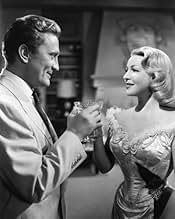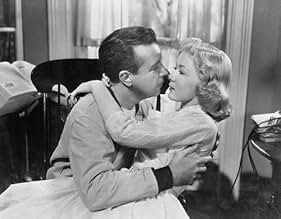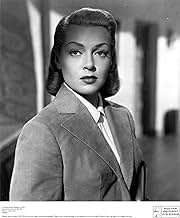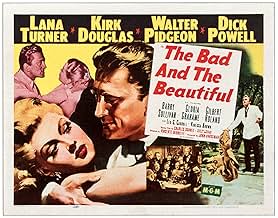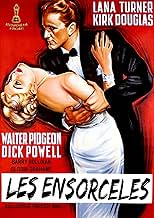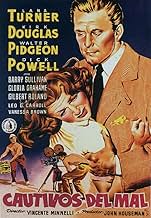AVALIAÇÃO DA IMDb
7,7/10
17 mil
SUA AVALIAÇÃO
Um produtor de filmes sem escrúpulos usa uma atriz, um diretor e um escritor para alcançar o sucesso.Um produtor de filmes sem escrúpulos usa uma atriz, um diretor e um escritor para alcançar o sucesso.Um produtor de filmes sem escrúpulos usa uma atriz, um diretor e um escritor para alcançar o sucesso.
- Direção
- Roteiristas
- Artistas
- Ganhou 5 Oscars
- 7 vitórias e 7 indicações no total
Jay Adler
- Mr. Z - Party Guest
- (não creditado)
Stanley Andrews
- Sheriff
- (não creditado)
Del Armstrong
- Georgia's Makeup Artist - Screen Test Scene
- (não creditado)
Ben Astar
- Joe - Party Guest
- (não creditado)
Barbara Billingsley
- Evelyn Lucien - Costumer
- (não creditado)
- Direção
- Roteiristas
- Elenco e equipe completos
- Produção, bilheteria e muito mais no IMDbPro
Avaliações em destaque
A story of betrayals and misunderstandings in the festering underbelly of Hollywood; this is Vincente Minnelli's cool expose of the workings of a producer (Kirk Douglas, as one of the movies' great detestable characters) and the effect he has on those who come into contact with him: a director who feels abandoned yet goes on to produce his greatest work (Barry Sullivan); an actress who is rescued from semi-alcoholism and turned into a star (Lana Turner, in one of her trademark parts); and a prize-winning novelist who is uprooted to shape his book for the screen (Dick Powell, in one of his last film roles before moving into television and film directing).
We see their stories in a series of flashbacks, linked by the three enemies of Douglas coming together in the office of studio biggie Walter Pidgeon who coolly reminds them of the good things the producer brought to their lives along with the bad. There are other good performers in smaller roles Gloria Grahame as Powell's twittery wife, Gilbert Roland as the Latin temptation, and so on. The Bad and the Beautiful', filmed in good old black and white, has plenty of meat to keep you watching. Only the slightly twee ending lets it down, but you can't have everything.
We see their stories in a series of flashbacks, linked by the three enemies of Douglas coming together in the office of studio biggie Walter Pidgeon who coolly reminds them of the good things the producer brought to their lives along with the bad. There are other good performers in smaller roles Gloria Grahame as Powell's twittery wife, Gilbert Roland as the Latin temptation, and so on. The Bad and the Beautiful', filmed in good old black and white, has plenty of meat to keep you watching. Only the slightly twee ending lets it down, but you can't have everything.
Producer Jonathan Shields is in big trouble on a production and reaches out to three people he's befriended and betrayed in the past for help. All three are brought to Harry Pebbel's office where he makes a pitch for the help of each one. And we're told in flashback the dynamics of the relationships between Shields and each one.
One thing about Tinseltown, they've never been afraid to show the seamier side of movie-making. Kirk Douglas's Jonathan Shields is a not too thinly disguised version of David O. Selznick. The same drive, the same ambition, the same overwhelming ego that Selznick was legendary for is a part that was tailor made for Kirk Douglas.
The three betrayed people, director Fred Amiel(Barry Sullivan), star Georgia Lorrison(Lana Turner), and screenwriter James Lee Barlow(Dick Powell)all ring very true. One of the things I like about this film is that all three stories, each in itself, could be expanded into a film all it's own.
Lana Turner's role as the ersatz Diana Barrymore is not to hard to spot either. It's so much better here than the film based on her own book Too Much Too Soon. If that voice of Turner's actor father on those 78 rpms she's playing sounds familiar, it's that of Louis Calhern. Turner's was a life lived out all too well in the tabloids and she brings all of it to bear in playing Gerogia Lorrison.
Dick Powell, who was offered the lead as Jonathan Shields, opted to play tweedy professor turned screenwriter James Lee Barlow. This was Powell's next to last feature picture as an actor, it should have been the one he went out on. Powell was always ahead of the industry's cutting edge and he decided to concentrate more on directing and acting for the small screen.
Powell's segment includes Gloria Grahame as his flirty wife. Post World War II Hollywood, whenever it had a part for a tramp, first call Gloria Grahame. Here she responds with an Academy Award winning performance. She hasn't many scenes, but as was said in another MGM picture around that time, what there is is cherce.
I don't think there's ever been an actor who can go from zero to sixty on the emotional scale as quickly as Kirk Douglas. Check the scene when Lana Turner discovers how Douglas betrayed her. The intensity of his reaction alone is frightening and real. Douglas was also up for an Oscar, but it went that year to laconic Gary Cooper in High Noon.
Vincente Minelli put all the pieces together just right and it comes out great entertainment.
One thing about Tinseltown, they've never been afraid to show the seamier side of movie-making. Kirk Douglas's Jonathan Shields is a not too thinly disguised version of David O. Selznick. The same drive, the same ambition, the same overwhelming ego that Selznick was legendary for is a part that was tailor made for Kirk Douglas.
The three betrayed people, director Fred Amiel(Barry Sullivan), star Georgia Lorrison(Lana Turner), and screenwriter James Lee Barlow(Dick Powell)all ring very true. One of the things I like about this film is that all three stories, each in itself, could be expanded into a film all it's own.
Lana Turner's role as the ersatz Diana Barrymore is not to hard to spot either. It's so much better here than the film based on her own book Too Much Too Soon. If that voice of Turner's actor father on those 78 rpms she's playing sounds familiar, it's that of Louis Calhern. Turner's was a life lived out all too well in the tabloids and she brings all of it to bear in playing Gerogia Lorrison.
Dick Powell, who was offered the lead as Jonathan Shields, opted to play tweedy professor turned screenwriter James Lee Barlow. This was Powell's next to last feature picture as an actor, it should have been the one he went out on. Powell was always ahead of the industry's cutting edge and he decided to concentrate more on directing and acting for the small screen.
Powell's segment includes Gloria Grahame as his flirty wife. Post World War II Hollywood, whenever it had a part for a tramp, first call Gloria Grahame. Here she responds with an Academy Award winning performance. She hasn't many scenes, but as was said in another MGM picture around that time, what there is is cherce.
I don't think there's ever been an actor who can go from zero to sixty on the emotional scale as quickly as Kirk Douglas. Check the scene when Lana Turner discovers how Douglas betrayed her. The intensity of his reaction alone is frightening and real. Douglas was also up for an Oscar, but it went that year to laconic Gary Cooper in High Noon.
Vincente Minelli put all the pieces together just right and it comes out great entertainment.
My tribute to the great Hollywood film composer, David Raksin, is long overdue. I only discovered the other day that he died a couple of summers ago at the considerable age of 92. I suppose I had thought that like most of those figures who reached their peak in the middle of the last century he had passed away many years ago. A re-seeing of "The Bad and the Beautiful" fairly recently reminded me of just how outstanding was his contribution to movies of all shades of quality. I first became aware of the uniqueness of the Raksin 'sound' on my original viewing of Wyler's "Carrie" in 1952. It is impossible to define, other than to say that it owes nothing to central European romanticism, the sound of almost all the in-house studio composers such as Newman, Stothart and Steiner, or to the tradition of 20th century symphonists such as Copland and Diamond which fed the imagination of film composers as diverse as Elmer Bernstein and David Amram. Raksin had a sound all his own as did Bernard Herrmann and Miklos Rozsa, as instantly recognisable as theirs but I feel his range is wider. He seldom repeated himself as did Rozsa who composed in the same style regardless of genre. ("Double Idemnity", "Ben-Hur" and "Madame Bovary" have nothing common apart from their same sort of watered down Kodaly-like music.) His style is intensely lyrical, conceived with a verve and passion that always transcended the most trivial movies and made them, if not worth watching, always worth listening to. Unlike many of his colleagues he seldom hit the jackpot by working on films of great quality. I think it only happened twice, with Abraham Polonsky's B movie "Force of Evil" which has become recognised as a marvellous example of film noir and of course William Wyler's "Carrie" where he was just one of many outstanding contributors to what I have long argued is possibly the greatest work of art to have ever emerged from the Hollywood studio system. Although it has its passionate advocates, I cannot share their enthusiasm for Vincente Minnelli's "The Bad and the Beautiful". It is certainly very professional in the way it slickly dissects an unsympathetic character through the flashback reminiscences of those he mistreated, but it had all been done before and considerably better in "Citizen Kane" and "All About Eve". However the film is worth watching if only to wallow in Raksin's gorgeous score. And there is plenty of it, particularly in accompanying all those voice-off narrations. And then just as one is beginning to wonder if the marvellous opening credit theme is about to be heard once too often, the composer introduces something entirely new for the Dick Powell narrative, a jaunty section based on a four-note motif (a falling perfect fifth, rising up a major sixth, then down a major seventh). The way this is subsequently developed is truly symphonic. Incidentally if you want to discover a film score that has the length and complexity of a symphony just close your eyes (you won't be missing much) and listen to "Forever Amber". Raksin in excelsis!
That one line summary makes me sound like I'm calling the Bad and the
Beautiful a case in 'tough love', where director Vincente Minnelli wags
his finger at what happens to some people (cough, David O. Selznick,
cough), while also showing too the joys of working in the business. But
it's a business at its most booming time, coming out of the 40s where
the producer was king, and the director had to vie for room at times to
really get his vision in. Here the producer Jonathan Shields is played
by Kirk Douglas as someone with big ideas at first- he even has an idea
to help make a scary movie about cats even more frightening by not
showing the cats (echoes of Val Lewton). Soon he rises the ranks and
becomes big enough to really call the shots all he wants, but it also
gets in the way of personal relationships, severs ties, and sometimes
even makes him out to be monstrous (there's one shot I remember all the
time where Douglas, in a big fit of anger against Lana Turner's
character, seems like he's a whole foot taller with the ego almost
manifested). The narrative of the film is a retelling by people who
knew him, a sexy but soon disillusioned actress, a director who once
worked with Shields but then got cut off from him, and a writer played
by Dick Powell.
Rashomon or Citizen Kane it is not in trying to reveal more grandiose and amazing things about human nature, but rather a supreme rumination on the good times and the bad times, possibly more of the latter.
What's great about Douglas's portrayal is that through the stories from the three ex-friends and co-workers and lovers, he becomes a very well-rounded character. At the core, of course, is the producer who at the time had as more creative say than anyone else on the set. This brings some of the great scenes ever shown about movie-making, such as the moment when Amiel, the director, tries to put Jonathan in his place about how a scene should be shot, "in order to direct a picture you need humility". Another comes with the moment when Jonathan and his soon to be 'asistant to the producer' has to object out of just being stunned. But more than Douglas, it's also tremendous, memorable screen time for Lana Turner, perhaps in her most successful performance in just sheer acting terms (not necessarily just in presence or style like in other pictures), and for Dick Powell, who with this and Murder My Sweet has two defining roles outside of his usual niche.
With many sweet camera moves, a script that crackles with the kind of scenes and dialog that makes one wish for the glory times of Hollywood's Golden Age, and at least four or five really excellent performances, The Bad and the Beautiful might not be as astounding and near-perfect as 8 1/2 or as funny as Bowfinger, but it ranks up there with the best movies about movie-making, and can make for some fine entertainment even for those who aren't really interested in how movies are made.
Rashomon or Citizen Kane it is not in trying to reveal more grandiose and amazing things about human nature, but rather a supreme rumination on the good times and the bad times, possibly more of the latter.
What's great about Douglas's portrayal is that through the stories from the three ex-friends and co-workers and lovers, he becomes a very well-rounded character. At the core, of course, is the producer who at the time had as more creative say than anyone else on the set. This brings some of the great scenes ever shown about movie-making, such as the moment when Amiel, the director, tries to put Jonathan in his place about how a scene should be shot, "in order to direct a picture you need humility". Another comes with the moment when Jonathan and his soon to be 'asistant to the producer' has to object out of just being stunned. But more than Douglas, it's also tremendous, memorable screen time for Lana Turner, perhaps in her most successful performance in just sheer acting terms (not necessarily just in presence or style like in other pictures), and for Dick Powell, who with this and Murder My Sweet has two defining roles outside of his usual niche.
With many sweet camera moves, a script that crackles with the kind of scenes and dialog that makes one wish for the glory times of Hollywood's Golden Age, and at least four or five really excellent performances, The Bad and the Beautiful might not be as astounding and near-perfect as 8 1/2 or as funny as Bowfinger, but it ranks up there with the best movies about movie-making, and can make for some fine entertainment even for those who aren't really interested in how movies are made.
Winning an Oscar has nothing to do with the amount of on screen time, so the shortness of Grahame's role does not bother me. However, her cartoonish interpretation of a Southern Belle is simply not worthy of an Academy Award, especially when the role is intended to be seriously dramatic. Jean Hagen most certainly deserved the Supporting Actress honor for her APPROPRIATE comedic turn as an over-the-top, unfortunately voiced silent film actress in "Singing in the Rain." And, folks, that scene with an hysterical Lana Turner driving in the rain is, well, HYSTERICAL.
VM was an excellent director, but some of his films, especially the overwrought melodramas, simply do not hold up. Yes, they always look great, but often the performances in the dramas are of the scenery-chewing variety.
In regards to another user's post, I agree that the scenario of Powell's character identifying his wife is ridiculous. The same thought immediately crossed my mind when seeing it for the first time.
My feelings towards Douglas's performance are mixed. At times he hits the mark, but at others, it is pure ham.
The film is definitely worth seeing, but it does not deserve the status of "classic." Its presentation of the industry is clichéd. As others have stated, "Sunset Boulevard" blows this film out of the water.
VM was an excellent director, but some of his films, especially the overwrought melodramas, simply do not hold up. Yes, they always look great, but often the performances in the dramas are of the scenery-chewing variety.
In regards to another user's post, I agree that the scenario of Powell's character identifying his wife is ridiculous. The same thought immediately crossed my mind when seeing it for the first time.
My feelings towards Douglas's performance are mixed. At times he hits the mark, but at others, it is pure ham.
The film is definitely worth seeing, but it does not deserve the status of "classic." Its presentation of the industry is clichéd. As others have stated, "Sunset Boulevard" blows this film out of the water.
Você sabia?
- CuriosidadesAt 9 minutes and 32 seconds, Gloria Grahame's performance in this movie became the shortest to ever win an Oscar. She held the record until 1976, when Beatrice Straight won for her 5 minute performance in Rede de Intrigas (1976).
- Erros de gravaçãoThe story takes place over an 18-year period, roughly 1934-1952, but the hairstyles and clothing of all the women, from beginning to end, are strictly 1952.
- Versões alternativasAlso available in a computer colorized version.
- ConexõesFeatured in O Diabo, a Carne e o Mundo (1959)
Principais escolhas
Faça login para avaliar e ver a lista de recomendações personalizadas
- How long is The Bad and the Beautiful?Fornecido pela Alexa
Detalhes
- Data de lançamento
- País de origem
- Idioma
- Também conhecido como
- Cautivos del mal
- Locações de filme
- Empresa de produção
- Consulte mais créditos da empresa na IMDbPro
Bilheteria
- Orçamento
- US$ 1.558.000 (estimativa)
- Faturamento bruto mundial
- US$ 2.025
- Tempo de duração
- 1 h 58 min(118 min)
- Cor
- Proporção
- 1.37 : 1
Contribua para esta página
Sugerir uma alteração ou adicionar conteúdo ausente



